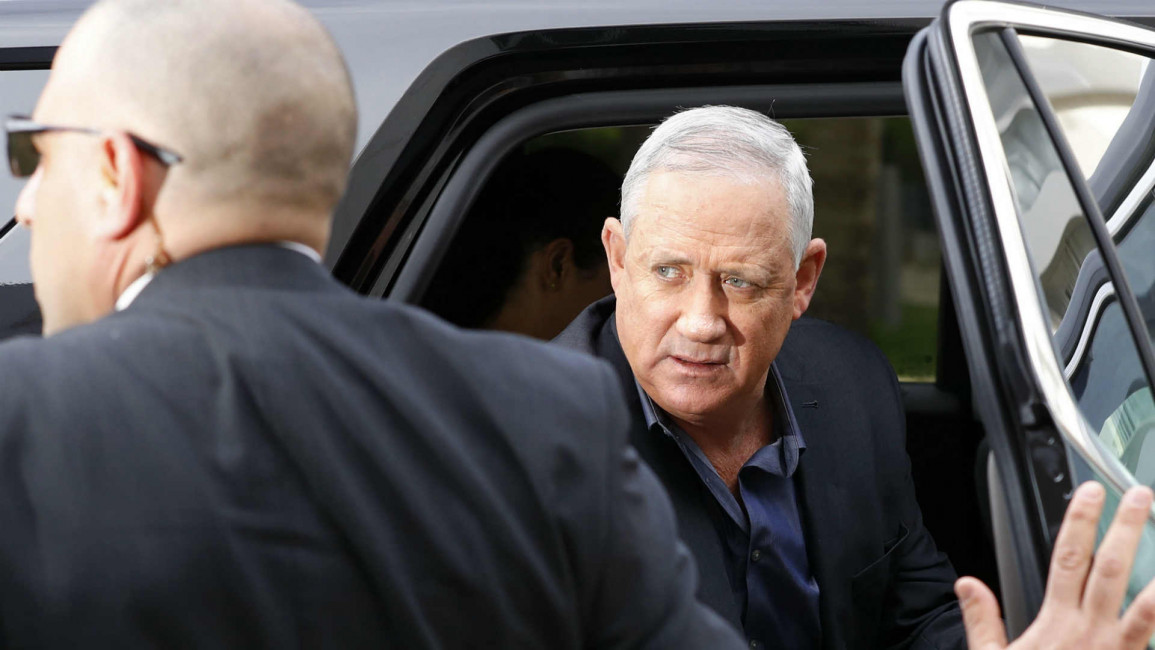Gantz meets Palestinian-Israeli politicians for talks on new government
Representatives from Benny Gantz's centrist Blue and White Party held talks with representatives from the Palestinian-Israeli Joint List alliance Wednesday on forming Israel's next government.
The Joint List is considering supporting Gantz's minority government from the outside rather than joining it outright, Israeli media reported.
Joint List lawmaker, Ahmed Tibi, said the two sides discussed "upcoming parliamentary issues" Wednesday and backing Gantz for prime minister, Haaretz reported. Tibi said the parties are set to meet again.
All factions of the Joint List are reported to have attended Wednesday's meeting, including Balad, which refused to endorse Gantz after Israel's September election. Balad told Haaretz Tuesday that they would recommend Gantz receive the mandate to form a government should the ex-military chief agree to their demands.
The demands include the government refraining from annexing settlements and altering the status quo of Jerusalem's al-Aqsa mosque compound.
President Rivlin urged political leaders to seek compromise on Wednesday, as he received official results from Israel's third stalemate election in less than a year.
|
"Any agreement you are able to come to that produces a stable government that gains the trust of the people will be welcomed," he told party heads.
"I am hopeful that the 23rd Knesset (parliament) that will be sworn in next week will last longer than its predecessors," he said, referring to deadlocked polls in April and September 2019.
The final results of the 2 March poll showed right-wing Prime Minister Benjamin Netanyahu's Likud party gaining 29.46 percent of the vote and 36 seats in parliament.
With his allies - two ultra-Orthodox Jewish parties and a nationalist one - Netanyahu's right-wing bloc has 58 seats, three short of a majority in the 120-seat knesset.
Centrist rival Gantz's Blue and White party gained 26.59 percent, earning 33 seats.
With the support of a left-wing alliance and the tacit backing of the predominantly Arab Joint List, which has a record 15 seats, he has the backing of 55 lawmakers.
In a repeat of the situation following the April and September votes, the nationalist Yisrael Beitenu, which won seven seats, holds the balance of power.
Its leader Avigdor Lieberman refused to back either candidate following both elections last year.
President Rivlin, whose role is largely ceremonial, has until March 17 to designate a candidate to form a government.
He has previously supported forming a unity government and called on all sides to put aside personal interests.
Netanyahu has defiantly insisted he won last week's election and accused his opponents of trying to "steal the elections" by aligning with Palestinian-led parties he claimed were hostile to the state.
Read more: Excluded from real representation, Arab citizens vote in Israel's election to protect Palestinian identity
Last week, Netanyahu said the Joint List shouldn't even be "part of the equation" of Israeli electoral politics, drawing new charges of incitement and racism from his opponents.
Netanyahu is due to face trial on 17 March over a series of corruption charges he denies.
He has been charged with fraud, breach of trust and accepting bribes in connection to a series of scandals that include accepting expensive gifts from wealthy friends and offering to exchange favours with powerful media moguls. The long-ruling Israeli leader denies any wrongdoing.
Follow us on Facebook, Twitter and Instagram to stay connected


![Lebanese protesters take part in a demonstration in support of Palestinians on 18 May 2021 in Beirut, Lebanon. [Getty]](/sites/default/files/styles/image_212x120/public/2021-06/GettyImages-1232967618.jpg?h=58c8a5e7&itok=VxDT8yaL)
